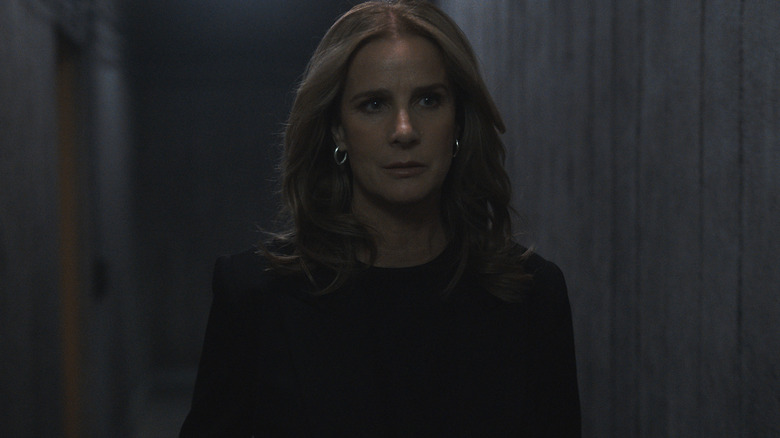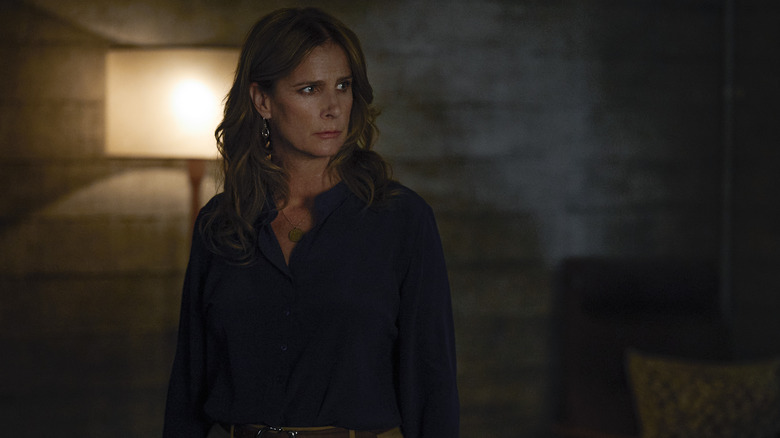The Wilds Star Rachel Griffiths On Whether Or Not Gretchen Is The Villain [Interview]
Prime Video struck gold with the first season of "The Wilds," an exceedingly binge-worthy thriller about a group of teenagers who find themselves stranded in the wilderness after an unexpected plane crash. Does this premise sound a little familiar? This turns out to be more of a feature than a bug, as "The Wilds" pays tribute to its predecessors and, in some ways, follows closely in their shoes: It shares a set-up with "Lost," and acts as a modern twist on the likes of "Lord of the Flies." But where the show thrives is in its differences — one key detail of "The Wilds" is that the plane crash that stranded the girls together was no accident. It was elaborately orchestrated by a team of scientists led by Rachel Griffiths' Gretchen Klein, in what she dubs the Dawn of Eve experiment.
The first season checks in with Gretchen as she surveils the girls and their progress, looking to see how they will attempt to survive in isolation. If it gives you comfort to know that adults are keeping an eye on them, think again — Gretchen and her team ultimately keep their distance, for the sake of the experiment's accuracy, opening the girls up to all sorts of unexpected danger that comes with being stranded in the wilderness. Beyond the physical threats — starvation included — is the trauma and psychological havoc that they must endure. As the first season reveals, all of this leads back to Gretchen's misguided attempt to overthrow the patriarchy: She believes a society constructed by women would far surpass the one currently credited to men. To prove herself right, she separately strands a group of teenage boys, to see how they fare in comparison. The second season will see Gretchen confronting the reality of her experiment, and the impact it had on her unwilling participants. /Film caught up with Rachel Griffiths to hear about what comes next for Gretchen, and what we can glean from the psychology behind the character.
'There's a small part of my brain that knows I'm the villain of the piece'
Do you think of Gretchen as the villain of the story?
I think I divide my brain into segments, and there's a small part of my brain that knows I'm the villain of the piece. I am the unreliable and morally questionable adult, in a world in which the children or the young people are living very authentic, earnest passages of life, I guess, to adulthood. But the rest of me, in designing the character, I think I've ... more looking to history and the dangerous people in the world, at the moment, who so believe in their own ideology being right that they are able to cognitively deny the collateral of their bad ideas. And also people who are clearly — they may think they're motivated kind of ideologically if you like, but it's probably more likely there is narcissism behind their need to be right. And [the need] to be extraordinary, and to be someone important.
I think those people don't look in the mirror and say, "I'm the villain." They look in the mirror and say they're fighting the good fight. They're going to overturn that election on January the 6th, because "this country has been stolen by liberals." So that part of me is, you can't judge yourself when you set up the design, do you know what I mean? But the character herself, she may have moments of doubt, but the doubt isn't actually about whether or not she is doing the right thing. It's just, will she pull it off? Because the fear of failure is so great. People who are certain are just very dangerous, don't you think?
Of course. So where do you think that her role as a mother plays into that? Because we did see a little bit of her relationship with her son in the first season, and it clearly plays into her motivation.
Look, I think Gretchen finds it almost impossible to be in an equal and genuine relationship where she's not in control. I don't know if she's on some kind of spectrum, which could be possible, but [she doesn't have] just that normal empathetic flow of valuing somebody intrinsically for who they are, not what they reflect about herself. Or being interested in their experience, even if it's not interesting to her own special interests, which is also very on the spectrum.
I think she's found it very difficult to have a genuine relationship with her own child, because everything is filtered through this ego, and through this intellectual idea of what she thinks her job is, as a mother. But I think the memo she never got was that the job is to connect and to bond, and make that child feel that they're never alone in the world.
Right.
She says the right things around that, but I don't think she's actually capable of the kind of vulnerability that is natural if one is truly present. Or prepared to have any real moral reckoning, in order to understand another person. The confrontation with one's own moral universe, that one has to risk if one is truly to be open to another person ... that one might disagree with, that may not be what one wants.
Season 2 of "The Wilds" is now streaming on Prime Video.

